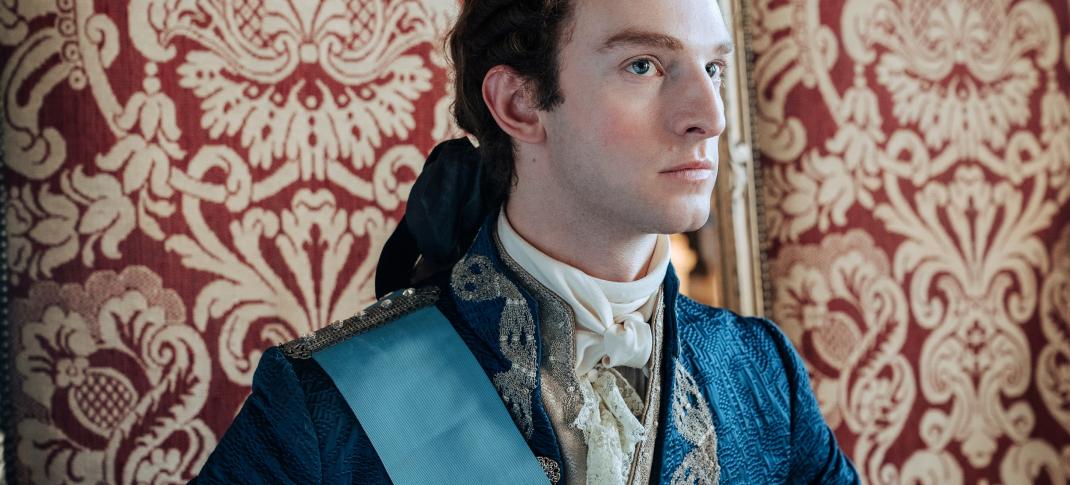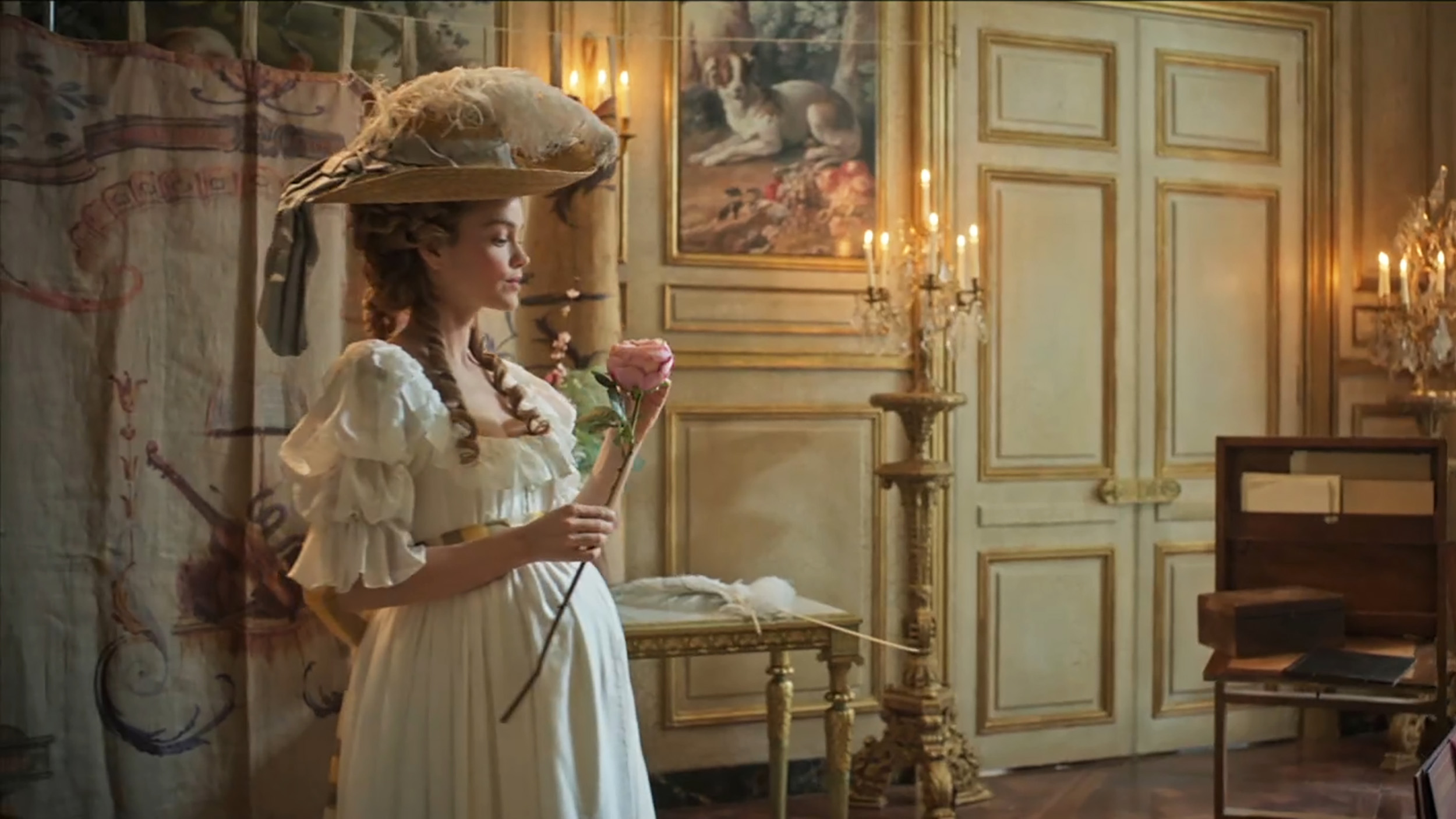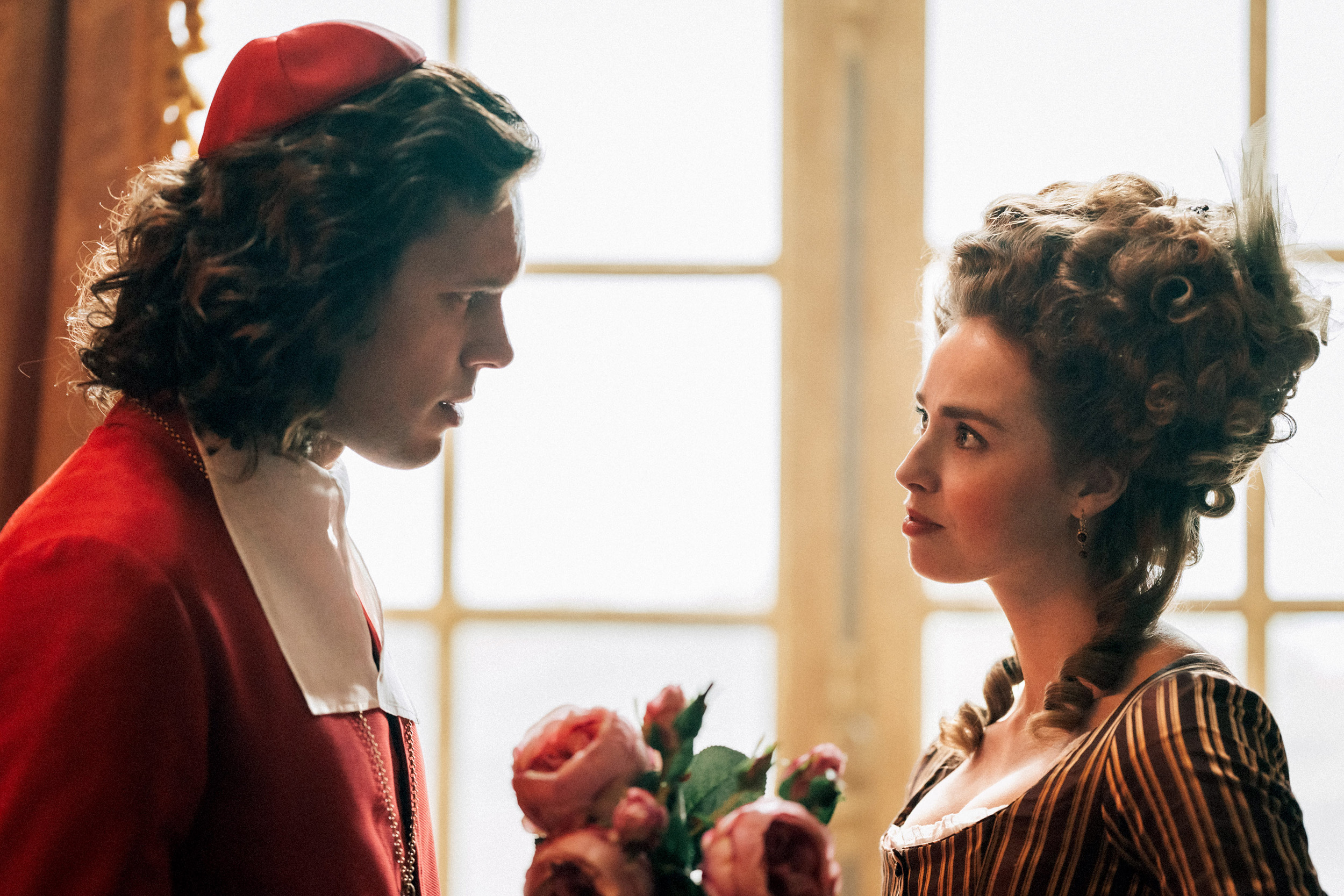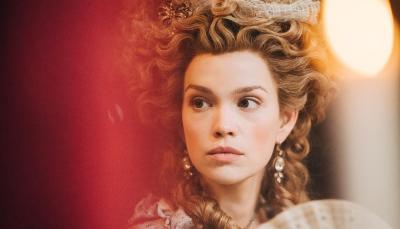Paternity Doubts Plague 'Marie Antoinette' in “Treacherous Legacy”

Louis Cunningham as Louis XVI in 'Marie Antoinette' Season 2
Caroline Dubois/Capa Drama/Canal Plus
After the queen’s indiscretions, Marie Antoinette’s third episode, “Treacherous Legacy,” finds Antoinette pregnant and questioning the paternity of her unborn child. She’s also trying to purchase the Saint-Cloud property to secure a safe place and legacy for herself and her children should something happen to the king. (She doesn’t know how right she’ll come to be.) But much to the queen’s dismay, the slimy Chartres is allowed back to Versailles after his father’s death, which makes him the Duke D’Orleans. Antoinette refuses to take part in his official welcome.
Chartres’ readmittance enables the crown to spy on him up close and to maintain sunny relations with the wealthiest family in France, whom Louis points out could easily create his own court. Back at the Palais Royal, Félicité is attempting precisely that, but Chartres obsessively focuses on Antoinette instead of royal ambition. They celebrate Beaumarchais’ release from the Bastille, who reports the king has many writers imprisoned for life. Chartres has spent the first three episodes acting like an abusive ex, and when it is he who commissions the printing of a scandalous new libelle (a million copies, no less), it feels like 18th-century revenge porn.
(To be clear, they never had sex – Antoinette rejected him and his rapey advances.)
The series’ most significant issue this season has been a failure to contextualize the French people’s sentiments. When Chartres’ libelle hits the streets near the end of the hour, its inflammatory message about Antoinette’s possibly illegitimate child and her pricey purchase leads the people to attack Saint-Cloud, leaving flaming carriages and a pig’s head on a spike in their wake.
But what brought them to that? We hear about France’s cash problems, but don’t see them. The season premiere briefly showed people freezing in the streets but didn’t otherwise explore the people’s plight.
Speaking of money, Louis is stunned when Calonne recommends yet another loan: ₣24 million, or France will collapse — the last loan barely paid the interest. But Louis is adamant they can’t ask Parliament for another approval, so Calonne suggests they borrow secretly from a bank. Louis’ advisor Vergennes doesn’t like the idea but proposes they approach Discount Bank, whom France helped previously. Meanwhile, Antoinette continues to pressure Calonne to allow her to purchase Saint-Cloud, unaware of France’s financial position.
When he balks at the price, Antoinette compels his support by revealing she knows he’s robbing the treasury to pay Yolande’s lover’s debts. He’s thrown, but warns her the cost will be unpopular since she has many enemies. She says that’s precisely why she needs Saint-Cloud. Vergennes also tries to stop Antoinette’s purchase, pointing out that married women can’t own property. Furthermore, she could bequeath it to her daughter or (worse) leave France politically vulnerable should her Austrian Archduke brother inherit it.
Although initially against it due to his suspicion about his wife’s infidelity, Louis is eventually convinced to let Antoinette buy the property when he realizes how few allies she has. The other thing that changes Louis’ mind is devastating news about his son’s health. The young dauphin has spinal tuberculosis, which will kill him in two to three years when his spine can no longer support his head. The disease was prevalent among the Bourbon family and killed Louis’ older brother.
Louis confides the news and his fears to Yolande. He talks about how horrible it was to listen to his brother die, “vertebrae by vertebrae, crack by crack.” His daughter appears healthy, but he worries about the child Antoinette is carrying. He tasks Yolande with finding von Fersen’s lineage from the court genealogist; if the queen’s baby is his, there’s a chance for a healthy heir. Yolande and the court doctor are sworn to secrecy about the dauphin’s condition. Later, Yolande delivers the scroll detailing von Fersen’s line, and Louis seems relieved that his family is long-lived. The shared secrecy of Louis’ inner life creates an intimacy between him and Yolande; it seems they’re teetering on the edge of an affair.
Antoinette tours Saint-Cloud with her daughter after finally purchasing it. She is surprised by Chartres, who is there with his son, about the same age as her daughter. He begs her forgiveness, but she won’t accept his apology, saying the friend he once was turned out to be fictional. After this second rejection, Chartres goes on the attack: he says he has testimonial proof from Beaumarchais and a maid of her infidelity and accuses her of purchasing the palace so she and her “bastard baby” have refuge when Louis kicks her out.
Chartres goes on to suggest his printing presses could be friendly to her if she’d agree to an arranged marriage between her daughter and his son. Antoinette angrily insists her daughter isn’t a bargaining chip and she’ll marry for love. She’ll never be beholden to a man, least of all an Orleans.
Antoinette sits for a new portrait in a white dress that resembles underclothing. She worries about her clothing choice but the artist – Élisabeth Vigée Le Brun (Leila Muse), who painted the queen’s most famous portraits – declares it will be a modern portrait for a modern queen. Then, in a scene that happens so fast, I nearly forgot it was in this episode, Antoinette gives birth to a son. She tells Louis he looks like him; Louis says he seems healthy. “Tell France I have a new son.”
Meanwhile, Jeanne has made a killing at court, raking in donations to her fake charity. She leaves bouquets of cabbage roses, portrayed as the queen’s favorite flower, for all the donors, including Rohan. He is disappointed his donation was acknowledged so impersonally and vows to keep donating until the queen forgives him.
This leads to Jeanne beginning a written correspondence with Rohan as the queen. With Jeanne crafting the words and Vilette transcribing them in the queen’s hand, and with a newly forged royal seal, they easily trick the eager-to-please cardinal. As a condition of their interaction, “the queen” insists Rohan use only her private guard (Villette) to communicate, or else she’ll be at risk.
At Rohan’s apartment for dinner, Count Cagliostro confronts Jeanne while Rohan is occupied. He is protective of his patron and suspicious of her and reveals that Lamballe asked “the spirits” if Jeanne was a fraud. They come to an understanding about not getting in each other’s way that relies on mutually assured destruction.
To allay her suspicions, Jeanne invites Lamballe to tea. She confesses to being a fraud – but not about her charity, as Lamballe thinks. Jeanne confirms the queen is her patron but that she fabricated their close friendship, only wishing she was the queen’s confidante. Still not fully convinced, Lamballe visits the court genealogist to determine Jeanne’s lineage. She’s surprised to discover Jeanne is a descendant of Henry II through a bastard son, and Lamballe has sudden empathy for her having to “endure the stain of illegitimacy.” She declares Jeanne is not an impostor.
Upon learning the diamond necklace will be sold in pieces, Jeanne steps up her plan, writing an urgent letter to Rohan for help to secretly buy it. He agrees but insists on discussing the details with her in person. Jeanne’s estranged husband, la Motte (Callum McGowan), who’ll help fence the diamonds, wonders how she’ll pull that off.
Marie Antoinette Season 2 airs Sundays on most local PBS stations, the PBS App, and the PBS Masterpiece Prime Video Channel at 10 p.m. ET. All eight episodes of the new series are available on PBS Passport for members to stream. Season 1 is available to stream for members on PBS Passport and on the Prime Video Masterpiece Channel.









